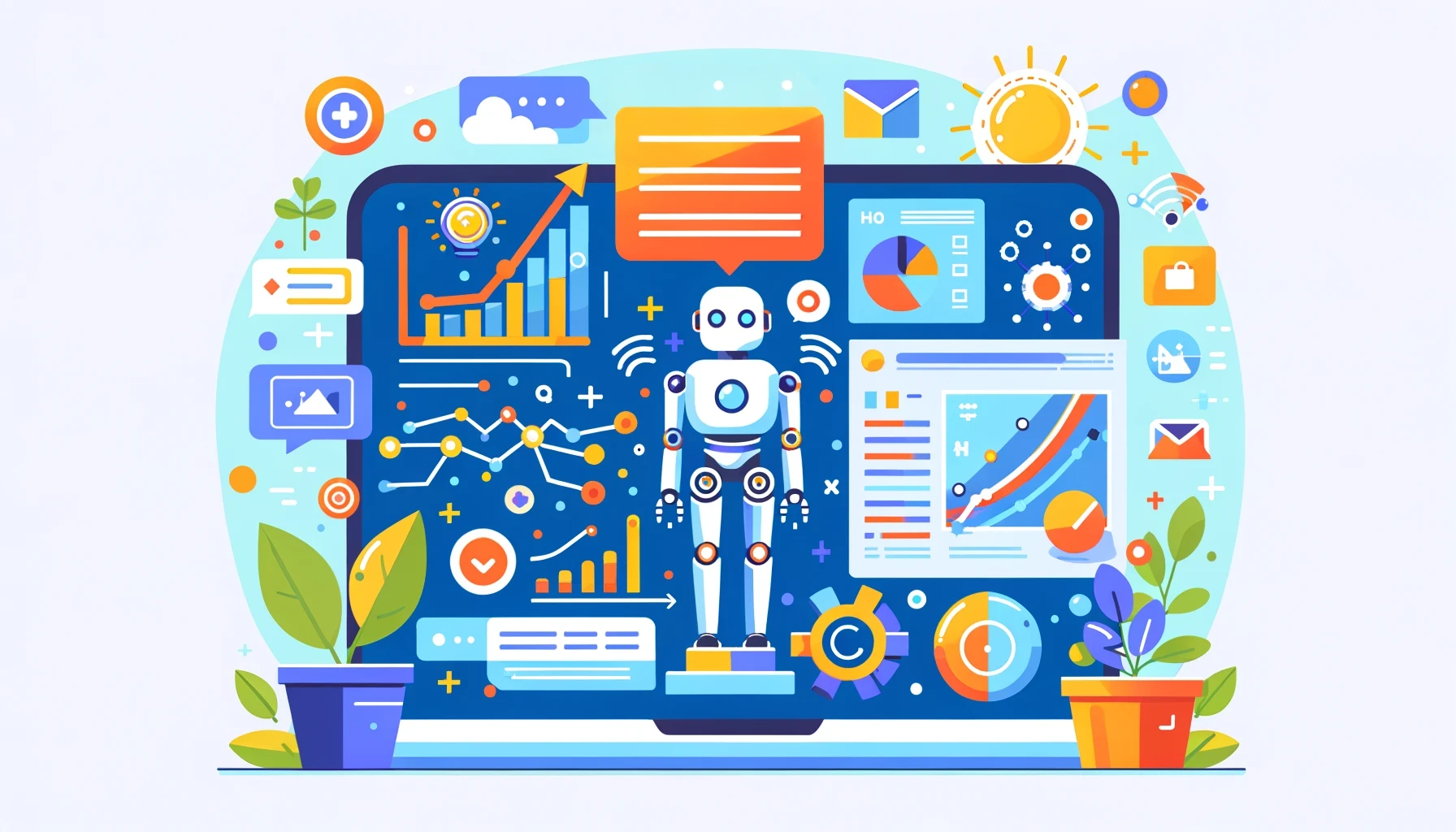
Generative AI is revolutionizing the landscape of digital marketing, ushering in a new era of innovation and efficiency. By harnessing the power of artificial intelligence, businesses can now create compelling content, tailor personalized experiences, and analyze data with unparalleled precision. This transformative technology is reshaping how brands engage with their audiences, driving impactful strategies and delivering measurable results. As we delve into how generative AI is shaping the future of digital marketing, it’s essential to understand its historical context and the significant milestones that have paved the way for this groundbreaking shift in marketing dynamics.
Table of Contents
Generative AI in Digital Marketing
Reshaping Strategies
Generative AI tools revolutionize digital marketing strategies by enhancing ad performance through predictive analytics. Marketers can now implement AI-driven strategies to tailor ads based on consumer behavior and preferences. By utilizing generative AI, businesses can explore innovative marketing approaches that resonate with their target audience, leading to higher engagement and conversion rates.
Moreover, generative AI enables marketers to incorporate personalized content creation techniques effortlessly. This technology analyzes vast amounts of data to deliver tailored messages, ensuring that each customer interaction feels unique and relevant. With the power of generative artificial intelligence, companies can create dynamic campaigns that adapt to individual preferences in real-time, maximizing the impact of their marketing efforts.
Businesses leveraging generative AI in digital marketing have a competitive edge in enhancing customer engagement. By generating AI-driven content, brands can capture consumers’ attention with relevant and compelling messaging. Interactive elements embedded in ads further boost engagement levels, encouraging users to interact with the brand actively. Through generative AI, marketers can create visually appealing content that resonates with their audience, fostering deeper connections and loyalty.

Enhancing Engagement
Generative AI transforms the way businesses engage with their audience by delivering personalized experiences at scale. The ability to generate AI-driven content allows brands to connect with customers on a more personal level, driving stronger relationships and brand loyalty. By implementing interactive elements in ads powered by generative AI, companies can create immersive experiences that captivate users’ attention and encourage them to take action.
Furthermore, utilizing generative AI for creating compelling visuals enhances engagement across digital marketing channels. From eye-catching graphics to personalized videos, this technology enables brands to stand out in a crowded digital landscape. By leveraging generative artificial intelligence tools for visual content creation, businesses can leave a lasting impression on their target audience and drive higher levels of engagement.
Optimizing Campaigns
Generative AI plays a crucial role in optimizing ad campaigns by providing valuable insights and automation capabilities. Marketers can leverage this technology to analyze campaign data effectively and make data-driven decisions for optimization. Through real-time adjustments powered by generative AI algorithms, businesses can ensure that their campaigns are continuously optimized for maximum performance.
Utilizing AI for real-time campaign adjustments allows marketers to respond swiftly to changing market dynamics and consumer behavior patterns. By harnessing the power of generative AI technology, businesses can stay agile and proactive in optimizing their digital marketing campaigns for better results. The ability to analyze campaign data quickly and accurately empowers marketers to fine-tune their strategies based on actionable insights derived from generative artificial intelligence.
Storytelling with AI Advertising
Brand Narratives
Generative AI tools enable advertisers to craft compelling and unique brand stories effortlessly. By leveraging AI algorithms, companies can develop engaging narratives that resonate with their target audience. These tools analyze vast amounts of data to create customized content tailored to specific brand identities. This approach ensures consistency across various marketing platforms, reinforcing brand recognition.
Creating cohesive brand narratives is crucial for establishing a strong presence in the digital landscape. Generative AI allows advertisers to maintain a consistent tone and message across different channels, including social media, websites, and email campaigns. By using AI-generated content, brands can ensure that their storytelling remains coherent and impactful, enhancing customer engagement and loyalty.
The use of AI-generated content goes beyond mere automation; it enhances the effectiveness of brand messaging and storytelling. With generative AI tools, advertisers can infuse creativity into their campaigns while maintaining brand authenticity. By incorporating AI-generated content into their strategies, companies can captivate audiences with compelling narratives that drive brand awareness and loyalty.
Customer Connection
Generative AI plays a pivotal role in helping brands forge deeper connections with their customers through personalized content. By analyzing consumer data and behavior patterns, advertisers can create highly targeted marketing messages that resonate with individual preferences. This personalized approach fosters stronger emotional connections between brands and consumers, leading to increased customer loyalty.
Tailoring marketing messages using AI insights enables advertisers to deliver relevant content that speaks directly to the needs and interests of their target audience. By understanding customer preferences on a granular level, brands can create impactful campaigns that drive engagement and conversions. This personalized communication strategy not only enhances customer relationships but also boosts overall marketing performance.
Understanding customer behaviors is essential for building lasting connections with consumers. Generative AI empowers advertisers to gain valuable insights into how customers interact with brands online. By leveraging this data-driven approach, companies can refine their marketing strategies to align more closely with customer expectations, thereby strengthening relationships and driving long-term success.
The Significance of AI Tools
Creative Optimization

Generative AI plays a crucial role in optimizing the creative aspects of digital marketing. By utilizing AI tools, marketers can experiment with various creative options to identify the most compelling and engaging ad elements. This enables them to tailor their advertising content to resonate with their target audience effectively.
Marketers can leverage generative AI to enhance ad creatives through dynamic content generation. This technology allows for the creation of personalized and relevant content that resonates with consumers on a deeper level. By harnessing the power of AI-driven creative optimization, businesses can significantly improve their advertising performance and drive better results.
Utilizing generative AI for creative optimization not only streamlines the content creation process but also helps marketers stay ahead of industry trends. By continuously refining and adapting their ad creatives based on AI insights, companies can ensure that their marketing efforts remain fresh, engaging, and impactful in today’s fast-paced digital landscape.
Cost Reduction
One of the key benefits of incorporating generative AI into digital marketing strategies is cost reduction. By leveraging AI tools for content creation, businesses can significantly reduce their advertising expenses while maintaining high-quality output. This cost-effective approach allows companies to maximize their marketing budget and achieve better ROI.
Generative AI enables marketers to optimize their ad spend by providing valuable insights and recommendations based on data analysis. By leveraging AI-driven analytics, businesses can make informed decisions about where to allocate their resources for maximum impact. This data-driven approach ensures that every advertising dollar is spent effectively and efficiently.
Implementing cost-effective strategies with the help of generative AI empowers businesses to reach a wider audience without overspending on marketing efforts. By utilizing AI-generated content, companies can create targeted campaigns that resonate with specific consumer segments, ultimately driving higher conversion rates and boosting overall revenue.
Impact on Small and Large Businesses
Benefits for All Sizes
Small businesses can now leverage AI technology to compete with larger enterprises in the digital marketing realm. With scalable AI solutions, both small and large businesses have equal opportunities to enhance their marketing strategies. This levels the playing field and allows businesses of all sizes to benefit from advanced AI tools.
AI-driven marketing enables small businesses to compete effectively with larger corporations by automating tasks like customer segmentation, personalized messaging, and campaign optimization. This automation saves time and resources, allowing small businesses to focus on strategic growth initiatives. As a result, smaller companies can reach targeted audiences more efficiently and compete with larger players in the market.
Scalable AI solutions cater to the specific needs of each business, regardless of its size. Whether it’s automating email campaigns, analyzing customer data, or optimizing social media ads, AI technologies can be tailored to fit the requirements of both small startups and established corporations. This adaptability ensures that businesses can maximize the benefits of AI without facing scalability challenges.
Beyond Sponsored Brands
AI is not limited to traditional sponsored brand content; it extends its capabilities to various marketing campaigns. By integrating AI-powered image-generation solutions, businesses can create engaging visual content for different marketing channels. This innovation enhances brand visibility and captures audience attention more effectively than static imagery.
In addition to sponsored brands, AI opens up new avenues for integration into diverse marketing initiatives. From chatbots providing personalized customer experiences to predictive analytics guiding strategic decision-making, AI technologies offer a wide range of applications beyond conventional advertising formats. This diversity allows businesses to explore innovative approaches in their marketing strategies.
Implementing AI technologies across different marketing channels leads to a broader impact on overall business performance. By incorporating AI in areas such as content creation, audience targeting, and campaign optimization, businesses can achieve higher efficiency and effectiveness in their marketing efforts. This comprehensive integration of AI ensures that companies stay ahead of the curve in an increasingly competitive digital landscape.
Safe Technology in AI Solutions

Responsible AI Use
AI technology in digital marketing must prioritize ethical and responsible practices to safeguard consumer trust. By ensuring that AI solutions adhere to strict ethical guidelines, businesses can maintain credibility and avoid potential backlash. Implementing mechanisms to protect consumer data and privacy is paramount in the age of data breaches and privacy concerns.
To uphold responsible AI use, companies should prioritize transparency by clearly communicating how AI algorithms are utilized in advertising strategies. By being transparent about the role of AI, businesses can build trust with consumers and demonstrate a commitment to ethical practices. Adhering to industry standards for AI implementation not only fosters responsible usage but also ensures compliance with regulations governing data protection.
- Pros:
- Enhances consumer trust
- Mitigates risks of unethical practices
- Cons:
- Requires additional resources for compliance
- Complexity in navigating evolving regulations
Collaboration within the industry is essential to establish unified industry standards for AI integration in marketing practices. By setting benchmarks and guidelines, businesses can ensure that AI-powered advertising remains ethical and effective. Defining best practices through collaboration with industry stakeholders enables companies to stay ahead of regulatory changes and technological advancements.
Industry-wide standards for AI implementation provide a framework for businesses to follow, promoting consistency and accountability across the digital marketing landscape. By embracing standardized practices, companies can streamline their adoption of AI technologies while maintaining alignment with ethical principles. Collaborative efforts among industry players create a cohesive approach to leveraging AI for marketing purposes.
- Establish benchmarks for ethical AI use
- Collaborate with industry peers on standardization efforts
- Regularly review and update guidelines based on emerging trends
Industry Standards
Collaborative initiatives are crucial in defining industry standards that govern the integration of AI technologies in marketing strategies. By engaging with peers and regulatory bodies, businesses can contribute to the development of comprehensive frameworks that promote responsible AI use. These standards serve as a roadmap for companies looking to leverage AI effectively while upholding ethical principles.
- Key Information:
- Guidelines ensure consistency across diverse marketing channels
- Industry standards foster innovation while prioritizing consumer welfare
- Engage in cross-sector dialogues on ethical AI practices
- Participate in standard-setting organizations to shape industry norms
- Advocate for transparent communication around AI implementation processes
Generative AI and Brand Engagement
Engaging Creative Content
Generative AI revolutionizes content creation by generating diverse and unique materials for brands. It enables marketers to produce engaging visuals and copy efficiently. By utilizing AI tools, companies can create compelling content that captures the audience’s attention rapidly.
Generating creative content through AI enhances user engagement by providing fresh and innovative materials consistently. Brands can tailor their messaging to specific audiences, increasing relevance and resonance. The ability to produce a variety of content formats ensures brands stay dynamic in their approach to engaging consumers.
Implementing generative AI tools allows brands to craft personalized content at scale, meeting the individual preferences of consumers effectively. This technology enables marketers to experiment with different styles, tones, and formats to find what resonates best with their target audience. Brands can create visually appealing content that stands out in a crowded digital landscape.
Consumer Feedback
AI-driven campaigns facilitate the collection of valuable consumer feedback through various channels such as surveys, social media monitoring, and sentiment analysis. Brands can use this feedback to pinpoint areas of improvement in their AI-generated content, ensuring that it aligns with consumer expectations and preferences.
By leveraging consumer insights derived from AI-powered feedback mechanisms, brands can refine their marketing strategies for better performance. Understanding customer sentiments helps marketers tailor their messaging to evoke desired emotions and responses from the target audience. This iterative process leads to more effective communication and brand-consumer relationships.
Utilizing feedback mechanisms integrated into AI platforms enhances customer experiences by enabling brands to address pain points promptly and optimize their campaigns based on real-time data. Brands can adapt their content strategy dynamically, ensuring that it remains relevant and engaging for consumers across various touchpoints. Incorporating consumer feedback into AI-driven campaigns fosters continuous improvement and innovation in digital marketing strategies.
The Future of Marketing with AI
Industry Shifts
AI is revolutionizing the marketing landscape, driving significant industry shifts. Embrace these advancements to enhance marketing strategies and improve customer engagement. By leveraging machine learning algorithms, businesses can analyze vast amounts of data to tailor personalized marketing campaigns. This approach enables companies to reach their target audience more effectively.
Adapting marketing strategies is crucial to align with the evolving trends in the industry. Stay informed about the latest AI applications in marketing to remain competitive and relevant in the digital space. Incorporating AI technologies allows marketers to automate tasks, optimize ad targeting, and deliver customized content based on consumer behavior. These innovations streamline processes and boost overall campaign performance.
To stay ahead of the curve, integrate AI innovations into your marketing practices. Utilize machine learning algorithms for predictive analytics, customer segmentation, and content optimization. By harnessing the power of AI, businesses can gain valuable insights into consumer preferences and behavior patterns. This data-driven approach enables marketers to make informed decisions and create targeted campaigns that resonate with their audience.
New Tools on the Horizon
Explore the upcoming AI tools and technologies designed specifically for marketing applications. Keep abreast of emerging trends such as natural language processing (NLP) for chatbots, image recognition for visual search, and predictive analytics for personalized recommendations. These cutting-edge tools empower marketers to deliver more engaging and relevant content to their target audience.
Staying informed about the latest developments in AI is essential for driving marketing innovation. Prepare for future tools that will revolutionize digital marketing strategies by investing in training programs and resources that focus on AI applications. As technology continues to advance rapidly, marketers must adapt quickly to leverage new tools effectively and stay competitive in the market.
Summary
Generative AI is revolutionizing digital marketing, enhancing storytelling, brand engagement, and overall business impact. The tools available now cater to businesses of all sizes, ensuring safe and effective technology integration. As AI continues to evolve, its role in shaping the future of marketing becomes increasingly prominent. Embracing generative AI can give your brand a competitive edge, driving customer engagement and loyalty while streamlining marketing efforts. Stay ahead of the curve by exploring how AI can transform your marketing strategies and propel your business towards success.
Related Article:
Featured Image courtesy of DALL-E by ChatGPT
